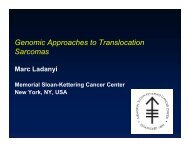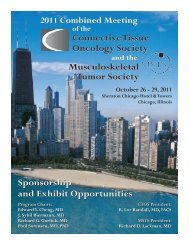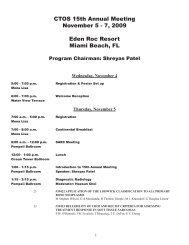207 Poster Session 2 - Connective Tissue Oncology Society
207 Poster Session 2 - Connective Tissue Oncology Society
207 Poster Session 2 - Connective Tissue Oncology Society
Create successful ePaper yourself
Turn your PDF publications into a flip-book with our unique Google optimized e-Paper software.
Scientific <strong>Poster</strong>s – <strong>Poster</strong> <strong>Session</strong> 2<strong>Poster</strong> #127THE ECONOMIC IMPACT OF CYTOREDUCTIVESURGERY AND TYROSINE KINASE INHIBITORTHERAPY IN THE TREATMENT OF RECURRENTOR METASTATIC GASTROINTESTINALSTROMAL TUMORS: A MARKOV CHAINDECISION ANALYSISNicole J. Look Hong, MD 1 ; Steven L. Chang 2 ;Chandrajit P. Raut 11Surgical <strong>Oncology</strong>, Brigham and Women’s Hospital / DanaFarber Cancer Institute, Boston, MA, USA;2Urologic <strong>Oncology</strong>, Brigham and Women’s Hospital / DanaFarber Cancer Institute, Boston, MA, USAObjective: The current first-line treatment for patients withrecurrent or metastatic gastrointestinal stromal tumors(GIST) is management with tyrosine kinase inhibitors(TKIs). There is an as yet undefined role for surgery in themanagement of these patients. The aim of this study is toexamine the economic impact of treating recurrent or metastaticGIST patients with TKIs in combination with surgeryat different time points in their treatment trajectories.Methods: A Markov chain decision analysis was modeledover a 2-year time horizon to determine costs associatedwith surgery performed in combination with imatinibmesylate(IM) or sunitinib malate(SU) in 7 scenarios variedby TKI agent, TKI dose, and disease status (stable vs. localizedprogressive disease). The base case was a 56 year-oldmale with recurrent or metastatic GIST taking IM 400mg.Economic data was calculated from average wholesalepricing of medications and physician/institutional costsdetermined by the Centers for Medicare & MedicaidServices. Rates of disease progression, surgical morbidity,mortality and adverse drug reactions were extracted fromexisting literature. Deterministic sensitivity analyses wereperformed to examine changes in cost due to variations indisease progression, recurrence, surgical procedures, andrates of surgical morbidity and mortality.Results: The least costly scenario was to perform surgeryon patients with stable disease on IM 800mg, which wasless than the cost of drug therapy without surgery. Themost costly scenario was to perform surgery on patientswith localized progressive disease on IM 800mg. This isdue to lower costs of IM compared to SU, combined withthe smaller proportion of patients on IM 800mg comparedwith IM 400mg. Costs were most influenced by the rateof death in patients on IM 400mg and the probability ofsurviving surgery, cumulatively addressing 82% of the riskin this model. The overall range of costs clustered withinapproximately $212,000(USD).Conclusion: Costs of surgical intervention at different timepoints within the treatment course of patients with recurrentor metastatic GIST fluctuate within a relatively narrowrange, suggesting that costs of care arise primarily from administrationof TKIs. The decision to pursue cytoreductivesurgery should be based on factors such as tumor biologyand not on cost alone. The impending economic effect ofIM coming off patent is uncertain. Future studies shouldincorporate health-state utilities when available.Table 1:Costs associated with 7 scenarios examinedin this modelScenarioSurgery for stable diseaseon IM 400mgSurgery for localized progressivedisease on IM 400mgSurgery for stable diseaseon IM 800mgSurgery for localized progressivedisease on IM 800mgSurgery for stable diseaseon SU 37.5mgSurgery for localized progressivedisease on SU 37.5mgNosurgeryCost (USD)over 2 years630,406.40718,777.30605,787.90817,807.60665,060.10703,807.10607,466.40<strong>Poster</strong> #128GASTROINTESTINAL STROMAL TUMOURS OFTHE RECTUM: A REVIEW OF SURGICALTREATMENT, OUTCOMES AND THE ROLEOF IMATINIBMichelle J. Wilkinson, MRCS 1 ; Edward Fitzgerald 1 ;Andrew J. Hayes 1 ; Dirk C. Strauss 1 ; Thomas M. Joesph 1 ;Ian Judson 1 ; Paris P. Tekkis 21Sarcoma and Melanoma Surgery, The Royal MarsdenHospital, London, United Kingdom;2Colorectal Surgery, The Royal Marsden Hospital,London, United KingdomObjective: Gastrointestinal stromal tumours (GISTs) of therectum are rare accounting for only 5% of all GISTs and0.1% of all tumours of the rectum. This study investigatesthe presentation, management and outcomes of rectalGISTs at a specialist sarcoma unit working with the colorectalSurgery Unit at the Royal Marsden Hospital.Methods: This retrospective cohort study was performedusing a prospectively maintained database at a sarcomatertiary referral centre over a continuous 12-year period228






